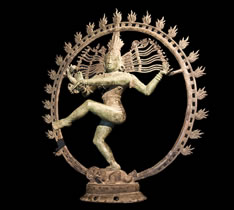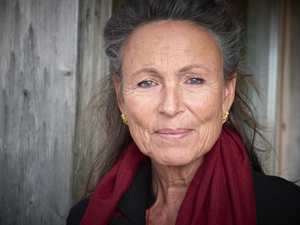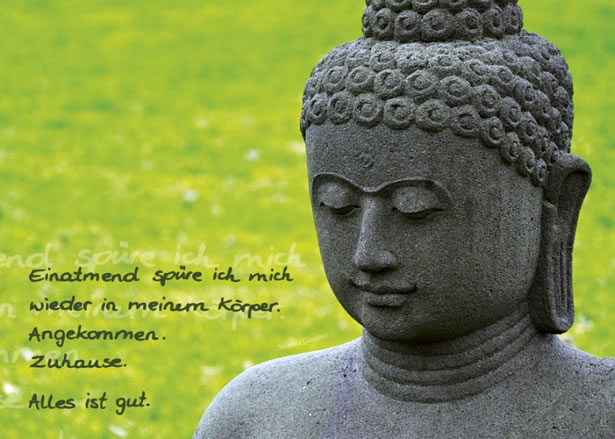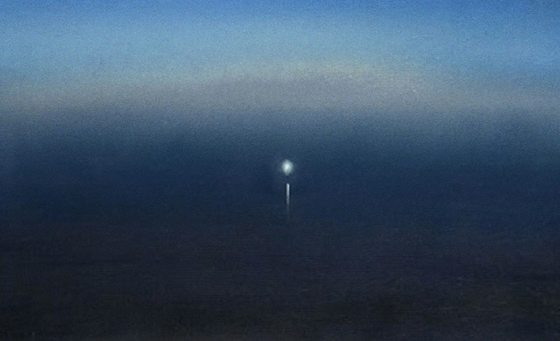We have to create miracles. A miracle is not the intersession of an external divine agency in violation of the laws of physics. A miracle is simply something that is impossible from an old story, but possible from within a new one. It is an expansion of what is possible. – Charles Eisenstein
Recently I was camped in Yosemite Valley and in the middle of the day four deer came to the edge of my campsite and bedded down near where I was sitting. I had the intuition that they were there for me. Four is the number I associate with angels. Later in the day I listened to an animal communicator talk about deer representing the importance of being gentle with yourself. It was just the message I needed at that moment.
Read More →Wie stark habe ich mich doch verkrampft. Habe versucht, festzuhalten, was sich nicht festhalten lässt. Endlich, dachte ich, gönne ich mir auch mal ein Stück von der Sicherheit, die mir so zuverlässig in der letzten Zeit immer unter den Füßen weggezogen wird. Doch alles was blieb war die Anspannung. Nervlicher und körperlicher Art. Ich begann zu kämpfen, um Halt, Geborgenheit, darum, dass die Dinge so bleiben mögen, wie sie sind – oder wenn nicht, dann zumindest doch so sein würden, wie ich sie gerne hätte. Doch je mehr ich rannte, umso schwergängiger wurde es. Der Magen begann zu schmerzen, der Darm zu rebellieren, die Haut juckte und ich, ich wurde immer erschöpfter. Bis ich aufgab, mich dem Leben ergab. Aufhörte zu kämpfen, gegen das Leben und gegen mich. Immer wieder von Neuem das annahm, was jetzt war, so schwierig dies auch war und immer noch ist. Und doch übe ich mich Ja zu sagen – auch zu dem Widerstand und dem Nicht-annehmen-Wollen.
Wenn der Boden unter den Füßen verschwindet
Ich erlebe es besonders im vergangenen Jahr immer wieder, dass immer dann, wenn ich beginne festzuhalten, mir etwas den Boden unter den Füßen wegzieht – plötzlich steht das Haus zum Verkauf, die Beziehung geht in die Brüche, Freundschaften brechen weg oder Geldsorgen tauchen auf. Manchmal kann ich sogar darüber lachen, ist es doch teilweise derart abstrus, ganz so, als würde da oben im Universum auf einer gemütlichen kleinen Wolke jemand sitzen und sich denken: Na, liebe Sabrina, wolltest du dich nicht darin üben, ganz im Moment zu leben? Das sieht mir aber nicht danach aus. Na das haben wir gleich. Und schwupps – ist der Boden wieder weg. Angenehm, ja, das ist wirklich etwas anderes. Doch es wird ebenso beschwerlich, wenn ich beginne, gegen das, was das Leben mir gibt, anzukämpfen. Stets mit dem Fluss zu fließen, komme was wolle – Stromschnellen, unbekannte neue Ufer, Länder, von denen ich noch gar nicht wage zu träumen, ja, das kostet gleichwohl ganz schön viel Mut und Vertrauen.
Und doch – kann ich für einen Moment aussteigen aus meinem Sorgenkarussell, aus der Frage, was das Leben mir jetzt schon wieder damit sagen will und welche Lösung es für all das geben soll, erkenne ich das größere Ganze. Ich sehe, dass es wirklich gerade diese Krisen und Brüche sind, die mich immer wieder dazu herausfordern, Vertrauen in mich zu fassen, Halt in mir zu finden und ganz im Jetzt zu leben. Denn, ehrlich gesagt, wenn alles entspannt läuft im Leben, ich mich vertrauensvoll bei allen Problemen auf meinen Partner verlassen kann, das Geld üppig in mein Leben strömt und der Alltags entspannt-wohlig dahinplätschert, habe ich nicht wirklich das Bedürfnis, etwas zu verändern, an mir zu arbeiten oder das Jetzt wahrhaft zu leben. Dann mache ich mir viel lieber Gedanken um den nächsten Urlaub, das neue Auto, den Restaurantbesuch am Abend. Vielleicht macht mich das nicht unbedingt glücklicher, aber es müsste wohl schon erst eine Krise auftauchen, ehe ich die Herausforderung des Lebens – ganz im Jetzt zu leben ohne Netz und doppelten Boden – annehme.
by Nishtha Müller
The inspired poetic Word was the means of passing on knowledge and experience by the Vedic Seers and by Sri Aurobindo, especially in his epic Savitri. What do the Vedic seers and Sri Aurobindo in their poetic creations themselves tell us about the Word, its nature and usage?
The central idea of this article is simply to make potential readers more conscious of the great value of mantric texts and point out a possible way to approach and use them. In regard to the Veda it must be said right from the outset that there exists the special barrier of the Sanskrit language in general and the multi-layer meaning of Vedic terms in particular. In addition there is the all-pervasive Vedic symbolism. Sri Aurobindo often calls the Vedic Rishis “symbologists“ and refers back to the period of the composition of the Vedic hymns both as the age of symbolism and the age of intuition. In fact Sri Aurobindo also makes much use of symbolism.
Let us begin now with some practical comparisons in regard to the transcendent origin of the Word as mentioned in the Veda and in Savitri. In Rig-Veda I.164 we read:
In the imperishable (place) of the illumining Word in the Transcendent Ether, all the Gods have taken their seat. Who does not know this (place), what can he do with the illumining Word (of the Veda)? But they, who know it, they sit here together in union. (39)
The radiant One has expressed herself in the forming of the flowing Waters. From one plane (of existence) she has manifested herself in two, in four, in eight, in nine planes. She is the imperishable with thousand (syllables) in the Transcendent Ether. (41)
From her flow out the oceans; by that live the four directions. From that moves the unmoving; by that lives the universe. (42)
In Savitri we find the following lines:
A glimpse was caught of things for ever unknown:
The letters stood out of the unmoving Word:
In the immutable nameless Origin
Was seen emerging as from fathomless seas
The trail of the Ideas that made the world …
(p. 40)

From all this we can deduct that on the transcendent plane or the superconscient we find an infinite potentiality of sound-forms, of which, in the context of human language, only a limited selection can be expressed through the organ of speech. Furthermore, in this context it is interesting to note that “akshara“ is, in the later tradition, not only one of the names for the sacred syllable OM, but also the general name for all syllables of the Sanskrit alphabet, perhaps so as to suggest that each of its sounds is still connected with its imperishable
origin, “the unmoving Word“. Then it is no surprise that in the Tantra all Sanskrit syllables
are called “Matrikas“, meaning little mothers.
Here are more lines from Savitri:
A Wisdom knows and guides the mysteried world;
A Truth-gaze shapes its beings and events;
A Word self-born upon creation‘s heights,
Voice of the Eternal in the temporal spheres,
Prophet of the seeings of the Absolute,
Sows the Idea‘s significance in Form
And from that seed the growths of Time arise.
(p. 271)
Above the parting of the roads of Time,
Above the Silence and its thousandfold Word,
In the immutable and inviolate Truth
For ever united and inseparable,
The radiant children of Eternity dwell
On the wide spirit height where all are one.
(p. 282)
Let us now look at three verses from a hymn to Agni, where we see how the Vedic seers seek after the higher planes of the Word. The translation is by Sri Aurobindo (in Hymns to the Mystic Fire).
To thee men illumined come with their thinkings for the conquest, to thee the imperishable One [comes] with her thousands. (VII.15.9)
Let him become the father of the Father in the womb of the Mother; let him break out into lightnings in the Imperishable, let him take his seat in the native home of the Truth.
O wide-seeing Fire, God who knowest all births that are, bring us the Word with its issue, the Word whose light shines in Heaven. (VI.16.35,36)

The different levels of the Word
With these last lines we come now to another most important aspect of the Divine Word, namely its manifestation on different levels of consciousness. The “imperishable One“ (akshara in fem. gender) means here the Divine Mother or Consciousness-Force (Cit-Shakti) in “the native home of the Truth“, which most likely relates to the transcendent and supramental level of the Word. In this context let us come to another quote from Rig-Veda I.164:
Read More → Sie ging weite Wege, bevor sie zur Sufi-Lehrerin Irina Tweedie und zu sich selber fand. Heute lehrt Annette Kaiser einen Weg jenseits der Wege “ den der Liebe. Von Martin Frischknecht
Sie ging weite Wege, bevor sie zur Sufi-Lehrerin Irina Tweedie und zu sich selber fand. Heute lehrt Annette Kaiser einen Weg jenseits der Wege “ den der Liebe. Von Martin Frischknecht
SPUREN: Sehnsucht scheint in deinem Leben eine konstante Begleiterin zu sein. Im Alter von 14 Jahren hat dich die Sehnsucht nach Paris in ein Nonnenkloster geführt. Danach ging es in deinem Leben dieser Spur nach weiter. Ist dir die Sehnsucht heute noch vertraut?
Annette Kaiser: Diese Sehnsucht war anfangs noch sehr unbewusst. Ich kam damals ins Kloster, um dort Französisch zu lernen. Das war der Grund, der es mir erlaubte, so jung von zu Hause wegzugehen. Im Kloster ist die Sehnsucht dann in mir erwacht. Es ging darum, das Verhältnis zwischen dem Göttlichen und dem Menschlichen besser zu verstehen, mich dem Göttlichen anzunähern und mit ihm eins zu werden.
Das war die ursprüngliche Sehnsucht in mir, ich wollte erfüllt werden von dem Einen und ins Einssein gelangen. Diese Sehnsucht hat sich in mir als Individuum erfüllt. Sie ist in jedem Augenblick neu erfüllt. Heute bewegt mich eine ähnliche Sehnsucht. Nun ist damit die Menschheit und die gesamte Welt gemeint. Es ist der Wunsch, dass wir alle über längere Zeit in dieses Einssein und Erwachen hineinkommen, wodurch uns eine ganz andere Dimension der kosmischen Intelligenz zugänglich wird, die den Verstand, den Intellekt und die Vernunft umfasst und transzendiert. Diese Dimension wird es uns ermöglichen, auf der Erde in den Frieden zu kommen und Lösungen zu finden für die Probleme, die heute anstehen. Ein inneres Bild zeigt mir, wie das aussehen könnte, und mit diesem Bild verbinde ich tatsächlich eine Sehnsucht.
Blicken wir nochmals zurück: Was würdest du zu dem Mädchen sagen, das du damals warst?
Ich würde sie in ihrer Sehnsucht bestärken und ihr erklären, wie es dazu kommt. Diese Sehnsucht basiert auf einem inneren Wissen, dass wir tatsächlich göttliche Wesen sind, die eine menschliche Erfahrung machen, und nicht umgekehrt, wie wir uns das immer vorstellen. Wir verstehen uns ja als getrennte Wesen von diesem Einen. Diese Sehnsucht ist die weibliche Seite der Liebe. Nach meinem Verständnis ist die Schöpfung aus einem Akt der Liebe entstanden. Wir befinden uns in einer Liebesbeziehung; die Liebe entspricht unserer Natur, nicht die Angst, die aus dem Gefühl der Trennung resultiert. Um das einer 14-Jährigen zu erklären, müsste ich dem anderen allerdings begegnen, damit ich auf genau diesen Menschen mit den richtigen Worten eingehen könnte.
Oneness is a fundamental, creative force present in all life, empowered when individual consciousness recognizes and aligns with it.
When we experience oneness, we feel in the gut and in the heart that we are part of something beyond ourselves, that there is harmony and meaning in life, and that every human being and every aspect of existence is uniquely valuable. We live oneness through respect, compassion, cooperation, and creativity, which naturally support the most fundamental needs of life.
For centuries, oneness has been described as a spiritual experience and principle. In Taoism, oneness is the Tao, „the way“ of life, which, like nature, has its own rhythms and patterns. Mahayana Buddhism trains its disciples to awaken from a solid, individual „self“ into an infinite, intelligent oneness that is empty and compassionate. And in the New Testament, the letter of St. Paul to the Ephesians describes „…one God and Father of all, who is over all and through all and in you all.“
Oneness as a spiritual ideal can seem daunting „as though we can only experience it after great effort. But oneness is not special „it’s special that we don’t live it more often. When we curb our natural response to help those in need, when we impose our will on nature instead of discovering how to work with it, when we choose to „get ahead“ instead of finding meaning and dignity in our work „we undermine the natural, relational, and unifying power of oneness.
Most of us live oneness without even knowing it „in our private and family lives where we naturally seek and value empathy, care, love, and unity. But these same experiences, which create the foundations of our most important relationships, can also play a role in building the future structures of our global community.






